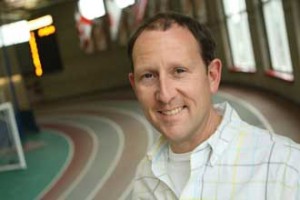
By Chris Chipello
Maybe if Kenny Perry had tried neurofeedback training, the coveted green jacket of Masters Tournament champions would be hanging in his closet now.
Instead, after botching the pressure-packed closing holes at Augusta National earlier this month, the veteran golfer settled for runner-up. “It just seems like when it gets down to those deals, I can’t seem to execute,” he said, according to the New York Times. “It just didn’t happen. All the big stars make it happen. That’s why they are where they are and we’re down here.”
Which begs the question: Do the “big stars” have a special gift for lifting their performance at crucial moments? Or can other top athletes, less accustomed to the big stage, also learn to quiet their nerves and sharpen their focus?
That’s where the McGill Department of Kinesiology and Physical Education comes in.
For the past four years, a small team of Masters students led by Prof. Gordon Bloom, Director of the McGill Sport Psychology Research Laboratory, has been quietly conducting bio/neurofeedback training with dozens of elite athletes, including skiers, skaters and hockey players. The goal of the program, funded through Sport Canada and the Centre nationale multisport in Montreal: help Canada’s Olympians achieve peak performance at the Vancouver games next winter.
Neurofeedback training, designed to enable people to alter their brain activity, has been used widely in the treatment of conditions such as attention-deficit/hyperactivity disorder. But relatively little rigorous work has been done on adapting the technique to help give top athletes a mental edge.
Bloom’s student-trainers conduct individual sessions in the McGill Seagram Sport Science Centre or at a satellite lab in Olympic Stadium. The athlete, seated in front of a computer, has sensors placed on the scalp and ears to monitor brainwaves. The athletes can see their brain activity on the computer screen – and learn gradually, through exercises such as video-game simulations, to produce patterns closer to the desired form.
Biofeedback, similarly, involves training to influence factors including heart rate, breathing, muscle tension and body temperature, said Catherine Duchesne, a sport psychology consultant who worked on the McGill project as a graduate student. The aim is to make athletes aware of their reactions to stress – and how to control them.
Some 30 to 40 athletes have participated in the McGill program. Each participant commits to 15 or 16 two-hour sessions. Between sessions, the athletes seek to apply the lessons in practice and competition.
The trainers have worked with a range of athletes – young and old, male and female. A few summer-sport athletes also have been included.
Mountain-bike racer Marie-Claude Surprenant says the feedback “really helped” improve her concentration during races. Before, “I’d get discouraged if someone passed me,” and lose focus. Surprenant, now 21, did the training just before moving up into a higher level of competition two years ago – and her performance at that level surpassed expectations, she said.
The McGill program took shape about four years ago, as Canada’s sports governing bodies mounted an ambitious effort to help Canadian athletes reach the podium at the 2010 Vancouver games. Winter-sports organizations were determined to avoid a repeat of the country’s showing at the 1988 Calgary games, when Canadians failed to win a single gold medal. Millions of dollars would be poured into training for Vancouver – including research in sport psychology.
To measure results from the McGill program, the researchers track athletes’ rankings; they also interview coaches and the athletes to help analyze any changes in performance.
“We haven’t finished the analysis, but our initial analyses are very positive,” Bloom said. “The athletes feel that they’re able to concentrate and focus a lot better, and that they’re in better control of their thoughts.”
Bloom has spent many years researching coaching methods. He has also worked in the past with prospects in the Montreal Canadiens’ organization, on their approach to the game.
“We haven’t gone to the Olympic Games with (the bio/neurofeedback program) yet, so I always say that we’re going to see the real value when they go to the highest level of competition. But I feel pretty confident, having worked with high-level athletes for a lot of years, that we’re giving them the tools to excel that they’ve probably never had before.”
